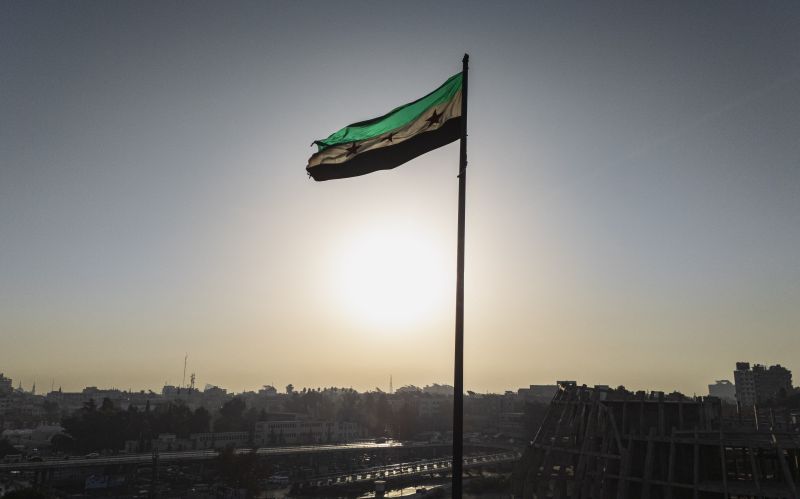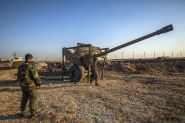- Home
- Middle East
- Six Months after Deposing Assad, Syria Faces Security, Economic Challenges

Syria Flag ©AFP
Syria's interim President Ahmed al-Sharaa has in six months established himself internationally and had crippling sanctions removed, but still needs to rebuild national institutions, revive the economy and unite the fractured country.
AFP looks at the main challenges facing Sharaa, whose Islamist-led coalition toppled longtime Syrian ruler Bashar al-Assad on December 8.
State building
After ousting Assad, Sharaa has had to navigate four political entities, each with their own civil, economic, judicial and military organization: the central government in Damascus, the incumbent president's former rebel authority in the northwest, Turkey-backed groups in the north, and a Kurdish-led autonomous administration in the northeast.
Radwan Ziadeh, executive director of the Washington-based Syrian Center for Political and Strategic Studies, said that creating relative stability in this fragile context was "a significant accomplishment" for Sharaa.
But guaranteeing the success of the five-year transitional phase will be "the most difficult challenge,” Ziadeh said.
The new authorities' ability to maintain stability was cast into doubt when deadly sectarian clashes hit the Syrian coast in March and the Damascus area the following month.
More than 1,700 people were killed in the coastal violence, mostly members of the Alawite minority to which Assad belongs, according to the Syrian Observatory for Human Rights monitor. The clashes near Damascus involved the Druze minority.
The treatment of minorities remains "one of the greatest internal challenges,” Ziadeh said, as "building trust between different components requires great political effort to ensure coexistence and national unity.”
Badran Ciya Kurd, a senior official in the Kurdish-led administration in the northeast which seeks a decentralized Syrian state, warned against "security and military solutions" to political issues.
The transitional government should "become more open to accepting Syrian components... and involving them in the political process,” Kurd told AFP, calling for an inclusive constitution that would form the basis for a democratic system.
US Secretary of State Marco Rubio warned last month that Syrian authorities could be weeks away from a "full-scale civil war" due to the acute challenges they faced.
Sharaa's "greatest challenge is charting a path forward that all Syrians want to be part of, and doing so quickly enough without being reckless,” said Neil Quilliam, associate fellow at the Chatham House think tank.
Security
There are pressing security challenges, with kidnappings, arrests and killings sometimes blamed on government-linked factions reported by the Syrian Observatory and on social media.
The recent bouts of sectarian violence have raised concerns over Sharaa's ability to keep radical fighters among his forces' ranks in check.
Washington wants foreign jihadists to leave the country, but Sharaa may find it difficult to let go of fighters who stood by his side for years, and some countries refuse to take them back.
Six foreign fighters have been promoted in the new defense ministry, sparking international criticism. A Syrian source with knowledge of the matter said, however, that Damascus had told the United States it would freeze the promotions.
Washington also wants the Syrian government to take control of Kurdish-run prisons and camps where thousands of suspected Islamic State group jihadists and their relatives are detained, but Damascus lacks the personnel to manage them.
Economy, diplomacy
Sharaa is leading a county battered by 14 years of civil war, with its economy depleted, infrastructure destroyed and most people living in poverty.
Under the new authorities, Syria has seen an increased availability of fuel and goods, including certain fruits whose import had previously been near impossible.
After Western governments lifted many sanctions, Sharaa's priority now is fighting poverty in order to "stabilize the country and avoid problems", according to a source close to the president.
Economist Karam Shaar said that beyond political stability which is essential for economic growth, other obstacles include "the regulatory framework and the set of laws necessary for investment, which unfortunately seem vague in many parts.”
Authorities have said they were studying legislation that could facilitate investments, while seeking to attract foreign capital.
Rehabilitating Syria's infrastructure is key to encouraging millions of refugees to return home, a major demand from neighboring countries and others in Europe.
Syria must also contend with neighboring Israel, which has carried out attacks and incursions since December.
According to Quilliam, Damascus is "light years away from considering normalization" with Israel -- a prospect pushed by Washington, after several other Arab states have done so in recent years.
Syria has admitted it held indirect talks with Israel, but the government has avoided taking a stance on normalization.
By Layal Abou Rahal/AFP
Read more



Comments